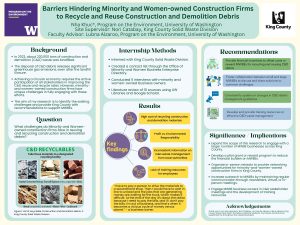Barriers Hindering the Minority and Women-Owned Businesses to Reuse and Recycle Construction and Demolition Debris
In King County, Construction and Demolition (C&D) waste constitutes about 30% of total waste generation. Despite recycling potential, a significant amount still ends up in landfills. In 2023, companies in the designated C&D recycling facilities program disposed of 220,000 tons of C&D waste, largely due to mixed materials and ineffective sorting. The purpose of this study was to understand the challenges faced by minority- and women-owned business enterprises (MWBEs), which is crucial for improving C&D waste diversion rates and supporting King County’s equity goals. To achieve this goal, I conducted interviews with MWBE construction firm owners and identified four main challenges: 1) High cost of recycling, 2) Tension between profit and environmental responsibility, 3) Inconsistent information from local authorities, 4) Undertrained staff in sorting and managing C&D waste. To address these issues and support MWBEs in improving their C&D waste management practices, King County should consider providing financial incentives to offset recycling cost, promoting clear guidelines on C&D waste management methods, fostering collaboration between various entities and businesses, and offering training resources for MWBE employees. By focusing on the challenges faced by MWBEs, King County can help these businesses overcome barriers to effective C&D waste management, ultimately contributing to increased recycling and reuse rates across the county’s construction industry while also supporting the goal of providing equitable services and opportunities for all.
